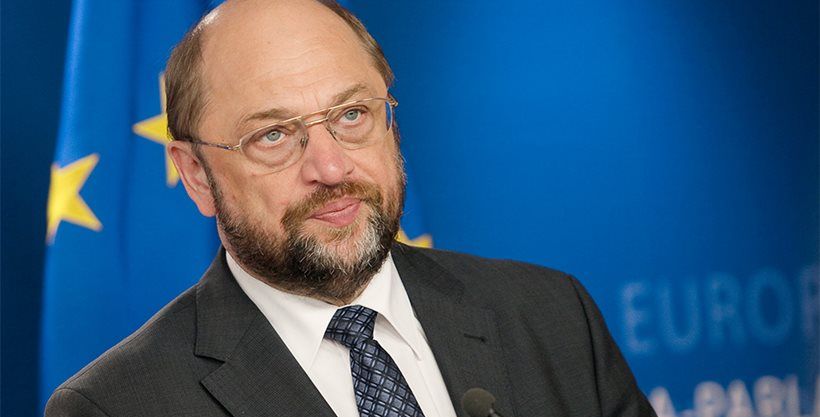The recent initiative of President of the European Parliament Martin Schulz to help facilitate communications between the new Greek government and its European partners, has led to the President’s official visit in Athens on Friday.
Analysts mention that the main goal of today’s meeting is, apart from being a chance to exchange views for the two main participants, to create a climate, which will influence the course of negotiations of the Greek government, with its partners, on the course to the crucial Eurogroup of February.
President Schulz spoke to Proto Thema, presenting his thoughts on the path of negotiations to reach a “Greek solution”, his initiative, the Greek debt, and the “changing tides” in European politics.
1. Which do you believe should be the concessions of Prime Minister Tsipras and SYRIZA in order to reach an agreement with their European partners?
I do not think that this is the moment for politicians to be speculating on what each side should consider as their red lines and what they should be ready to concede on. More importantly neither is it the time for any side to be making any headline grabbing statements. Rather all political forces, both in Europe and in Greece, would do well to take good note of the result in Greece and work to create the most serene environment within which talks can take place.
2. Was it your personal initiative to act as an intermediary between the new Greek government and their European partners? There are voices in Greece that are suggesting that you are acting on behalf of Angela Merkel, how would you respond to them?
I am acting on nobody’s behalf other than a European politician with an interest in a fair solution. If I can contribute to finding a just solution then I will play my part to the full.
3. What is your view on a Greek solution? Collision, compromise, or extension of the existing uncertainty?
A solution for Greece will only be found through a compromise. Both sides need to listen carefully and patiently to the concerns of the other and be ready to show flexibility. My hope is that after the pre-election rhetoric from both sides we will be moving towards more conciliatory positions.
By working in a constructive spirit we can achieve a win-win solution.
4. Do you think that the discussion of a possible Greek debt restructuring could be put on the table?
I do not think it is useful to focus entirely on debt restructuring.
There is in any case at the moment certainly no majority of the other member states that is in favour of such an option. I say this not to slam any doors shut but because it is necessary to be frank and because I fear that the issue of restructuring could monopolise the debate with little results.
Instead it would be better to focus on a wider range of options such as how to better use Greece’s budgetary surplus for its own economy, long term investments leading to sustainable growth, fighting clientelism, tax evasion, and improving tax collection especially in relation to Greece’s richest.
If the government tackles these issues we will stand fully behind it.
5. CDU and Chancellor Angela Merkel have repeatedly stated that they disagree on any more burdening of the German taxpayer for Greece. What is your opinion?
The taxpayers across the EU, not just the Germans, are providing guarantees to Greece with large sums of money. That is a strong act of solidarity shown by the EU. In exchange, I think that it is fair to ask that all should be done to not avoid that these guarantees need to be spent.
6. Are those who speak of a potential Grexit, hurting the cohesion of Europe?
Grexit is in nobody’s interest and it is not on the agenda.
7. With the electoral victory of SYRIZA in Greece, do you see a possible change in the political balance of the Southern European Member-States?
I think that the political environment in a member state is to a large extent specific to that country. There is a general consensus taking shape across all major political parties in Europe that a policy shift is needed: A move away from an almost exclusive focus on fiscal consolidation towards an intelligent policy mix of structural reforms, sound public finances, and investments to stimulate sustainable growth.




































